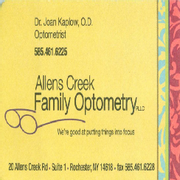Are Bifocals or Progressive Lenses Right for You?

As individuals grow older, they will often develop presbyopia—a condition that makes it difficult to focus on objects up close. But when you’re already unable to see objects far away—known as myopia—you might need a special pair of glasses to be able to see both distances comfortably. Luckily, you can address these problems with the help of either bifocal or progressive lenses. But which one is right for you? If you’re weighing your options, consider this brief comparison of these lens types.
How Do Bifocals Work?
 Bifocals are a traditional approach to correcting issues with distance viewing. These glasses feature a distinct horizontal line near the middle of the lens that separates between two viewing powers. To see objects far away, individuals focus their eyes toward the top of the lens. For up-close reading, they shift their focus to the bottom of the lens.
Bifocals are a traditional approach to correcting issues with distance viewing. These glasses feature a distinct horizontal line near the middle of the lens that separates between two viewing powers. To see objects far away, individuals focus their eyes toward the top of the lens. For up-close reading, they shift their focus to the bottom of the lens.
How Do Progressive Lenses Work?
Progressive lenses are similar to bifocals in that that can help individuals see both far away and up-close. However, they do not feature a noticeable line that divides the different lens powers. Instead, progressive lenses gradually transition between multiple powers, allowing individuals to seamlessly focus on faraway and near objects, as well as everything in between.
Which is Right for Me?
Many bifocal users find that learning how to shift between different lens powers is challenging at first, and may even cause dizziness. However, users become accustomed to the bifocals quickly—and even prefer them—as they allow their eyes to “jump” and focus quickly on objects far away and up-close.
In order to seamlessly transition faraway and up-close focus, progressive lenses tend to create a mild visual distortion near the edges. Over time, new users are usually able to adjust to progressives with ease. Given the lack of noticeable line, most people prefer progressive glasses over bifocals. Many also appreciate progressives’ ability to shift between multiple lens powers without having to “jump” between two.
The best way to determine if bifocal or progressive lenses are right for you is to consult a trusted eye doctor, such as those at Allens Creek Family Optometry in Rochester, NY. Treating every patient as an individual, this practice will guide you through the eye exam process to determine what your exact vision needs are. From there, they will help you explore a variety of corrective eyewear solutions—including glasses and contact lenses—and help you achieve the perfect fit. Visit this vision center online to learn more about their comprehensive services or call (585) 461-6225 to schedule an appointment.
About the Business
Have a question? Ask the experts!
Send your question

